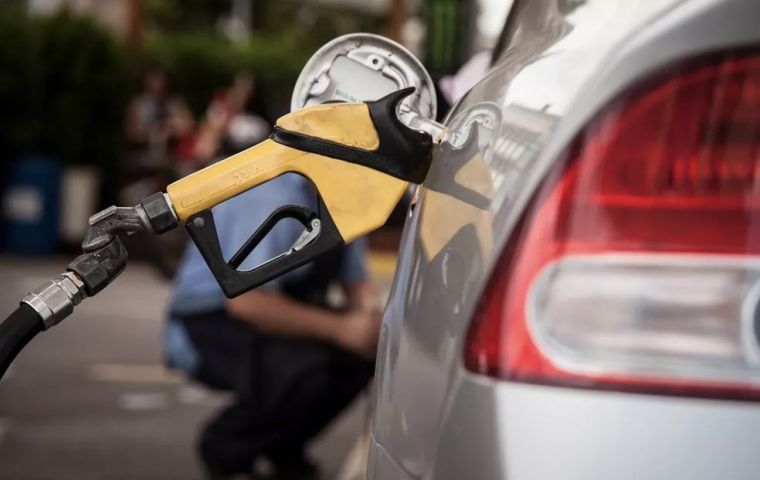MercoPress. South Atlantic News Agency
Gasoline at pumps in Brazil up again after 15 weeks
 The price of fuel at pumps plays a role in Bolsonaro's popularity ahead of the Oct. 30 runoffs
The price of fuel at pumps plays a role in Bolsonaro's popularity ahead of the Oct. 30 runoffs Brazil's National Agency of Petroleum, Natural Gas and Biofuels (ANP) said in its weekly report Monday that the price of gasoline at pumps nationwide had gone up 1.47% after 15 weeks of successive drops.
Between Oct. 9 and 15, drivers paid an average of R$ 4.86 (US$ 0.92), the ANP document showed.
A 2 % increase at the privately-operated Maritape Refinery was announced last Saturday, in addition to a 9.7 % adjustment a week before. Acelen, the company operating the refinery, followed international market variations, it was explained.
The price of a barrel of Brent crude oil, which fell sharply in September, reaching US$ 82, rose again above US$ 90 this month under the influence of the decision by the Organization of Petroleum Exporting Countries (OPEC) to cut down output.
Petrobras, however, has not announced any changes in the prices charged at its refineries for more than a month. The last change was a 7% reduction announced in early September.
Since 2016, Petrobras has adopted the Import Parity Pricing Policy (PPI), which links the prices charged in the country to those charged in the international market. The reference is the Brent-type barrel of oil, quoted in US dollars.
Based on the PPI, fuels suffered a strong increase in the first half of the year, which irritated incumbent President Jair Bolsonaro. In May, he appointed Caio Mário Paes de Andrade as head of Petrobras. He also issued a provisional measure, later approved by Congress, relieving taxes and contributing to the drop in fuel prices. There was, however, no announcement of a change in the PPI.
Opposition lawmakers have warned that the government had been pressuring Petrobras' management to hold down prices amid the electoral process, while Bolsonaro argued that a decrease in the price of fuel entailed a fall in the price of food.
According to the Brazilian Association of Fuel Importers (Abicom), the average value of gasoline in the country's refineries is lagging by R$ 0.30 per liter, or 8%. The entity monitors almost daily the variations taking into account the PPI.
Brazilian gas stations also raised the prices of hydrous ethanol. It is the second consecutive increase. The liter of ethanol has been sold, on average, at R$ 3.46 (US$ 0.66), 2.08% higher than the price registered in the previous survey.
ANP's weekly assessment also showed a 0.33% increase in the price of cooking gas. The 13-kilogram cylinder has been sold at an average of R$ 110.99 (US$ 21). Diesel fuel, meanwhile, remained stable, at R$ 6.51 (US$ 1.23) last week, R$ 0.01 lower than in the previous study.
Meanwhile, the P-71 oil-extracting sea platform will yield up to 150,000 barrels/day of oil in the Santos Basin, Agencia Brasil reported Monday quoting Petrobras sources.
The structure left the Jurong Aracruz shipyard, in Espírito Santo, last Saturday (15), bound for the Itapu field, in the pre-salt region of the Santos Basin. It will produce daily up to 150,000 barrels of oil and up to six million cubic meters of gas. Its storage capacity reaches 1.6 million barrels of oil.
The P-71 is an FPSO (floating production, storage, and oil transfer system) type platform. In the Santos Basin, it will perform the next stage of the project, which is its anchoring in the field, followed by the interconnection to the risers unit's production pipelines.
P-71 is scheduled to start operating in December of this year and should reach peak production by the end of 2023. The unit belongs to Petrobras and will be the last of the Replicant series, which also includes the P-66, P-67, P-68, P-69, and P-70 platforms.
“These units feature high production capacity, advanced operating technologies, and reduced emissions, with the same replicated engineering design,” Petrobras said in a statement.
The FGRU (Flare Gas Recovery Unit) system, used to take advantage of the gas generated in the production process and to reduce its burning and release into the atmosphere, is an example of the technology used in the Replicants to reduce emissions, the company explained.




Top Comments
Disclaimer & comment rulesCommenting for this story is now closed.
If you have a Facebook account, become a fan and comment on our Facebook Page!